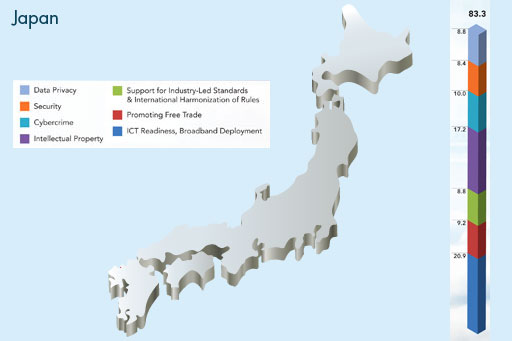 1. JapanTotal score: 83.3Data privacy: 8.8 Security: 8.4 Cybercrime:10.0 Intellectualproperty: 17.2 Support forindustry-led standards: 8.8 Promoting freetrade: 9.2 ICT readiness:20.9 “Those interested in advancing cloud computing can find amodel in Japan,” BSA writes. “Japan has a comprehensive suite ofmodern laws that support and facilitate the digital economy andcloud computing—from comprehensive privacy legislation that avoidsburdens on data transfers and data controllers to a full range ofcriminal and IP law protections. Further, Japan is a leader in thedevelopment of international standards related to cloud computing,and the country is working to provide all households withhigh-speed fiber broadband connections in the next 3 years.” Japanalso is among the countries that are members of the WTOAgreement on Government Procurement, which liberalizes suchpolicies.
1. JapanTotal score: 83.3Data privacy: 8.8 Security: 8.4 Cybercrime:10.0 Intellectualproperty: 17.2 Support forindustry-led standards: 8.8 Promoting freetrade: 9.2 ICT readiness:20.9 “Those interested in advancing cloud computing can find amodel in Japan,” BSA writes. “Japan has a comprehensive suite ofmodern laws that support and facilitate the digital economy andcloud computing—from comprehensive privacy legislation that avoidsburdens on data transfers and data controllers to a full range ofcriminal and IP law protections. Further, Japan is a leader in thedevelopment of international standards related to cloud computing,and the country is working to provide all households withhigh-speed fiber broadband connections in the next 3 years.” Japanalso is among the countries that are members of the WTOAgreement on Government Procurement, which liberalizes suchpolicies. 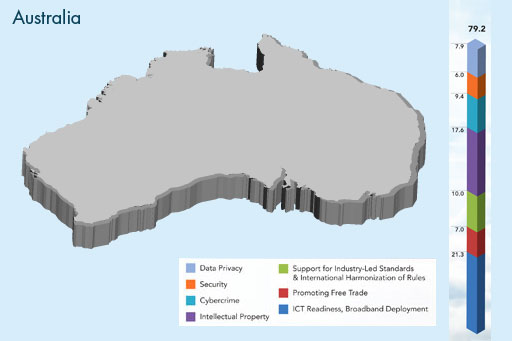 2. AustraliaTotal score: 79.2Data privacy: 7.9 Security: 6.0 Cybercrime:9.4 Intellectualproperty: 17.6 Support forindustry-led standards: 10.0 Promoting freetrade: 7.0 ICT readiness:21.3Major national broadband network infrastructure improvementsare underway in Australia and a range of EU countries.
2. AustraliaTotal score: 79.2Data privacy: 7.9 Security: 6.0 Cybercrime:9.4 Intellectualproperty: 17.6 Support forindustry-led standards: 10.0 Promoting freetrade: 7.0 ICT readiness:21.3Major national broadband network infrastructure improvementsare underway in Australia and a range of EU countries. 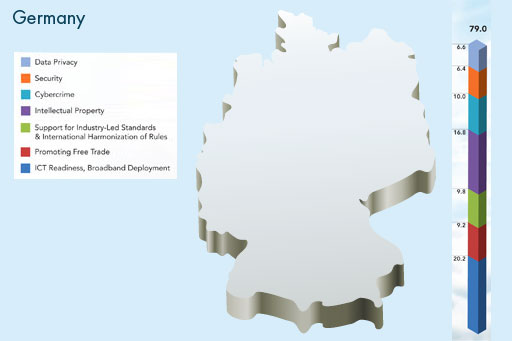 3. GermanyTotal score: 79.0Data privacy: 6.6 Security: 6.4 Cybercrime:10.0 Intellectualproperty: 16.8 Support forindustry-led standards: 9.8 Promoting freetrade: 9.2 ICT readiness:20.2“Germany…is a country that scores well in the initialScorecard, but it threatens to undermine that advantage with overlyrestrictive legal interpretations to keep some data within nationalborders,” BSA writes.
3. GermanyTotal score: 79.0Data privacy: 6.6 Security: 6.4 Cybercrime:10.0 Intellectualproperty: 16.8 Support forindustry-led standards: 9.8 Promoting freetrade: 9.2 ICT readiness:20.2“Germany…is a country that scores well in the initialScorecard, but it threatens to undermine that advantage with overlyrestrictive legal interpretations to keep some data within nationalborders,” BSA writes. 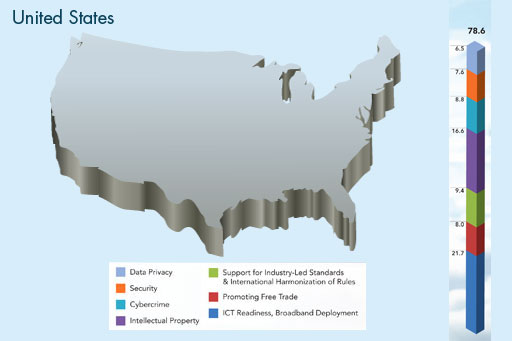 4. UnitedStatesTotal score: 78.6Data privacy: 6.5 Security: 7.6 Cybercrime:8.8 Intellectualproperty: 16.6 Support forindustry-led standards: 9.4 Promoting freetrade: 8.0 ICT readiness:21.7The U.S., along with EU members and Japan, has laws that arebroadly compliant with the Convention on Cybercrime. The U.S.'s National Institute for Standardsand Technology is “carefully eyeing cloud computing,” and theU.S. finished third in the section for support of industry-ledstandards and international harmonization of rules.
4. UnitedStatesTotal score: 78.6Data privacy: 6.5 Security: 7.6 Cybercrime:8.8 Intellectualproperty: 16.6 Support forindustry-led standards: 9.4 Promoting freetrade: 8.0 ICT readiness:21.7The U.S., along with EU members and Japan, has laws that arebroadly compliant with the Convention on Cybercrime. The U.S.'s National Institute for Standardsand Technology is “carefully eyeing cloud computing,” and theU.S. finished third in the section for support of industry-ledstandards and international harmonization of rules. 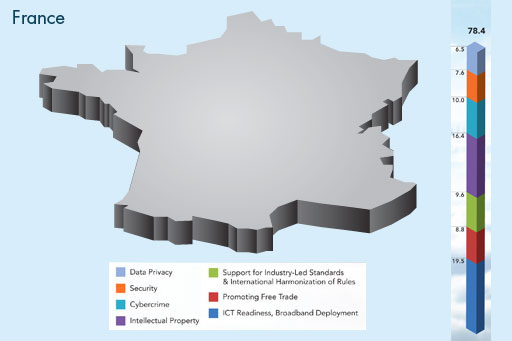 5. FranceTotal score: 78.4Data privacy: 6.5Security: 7.6 Cybercrime:10.0 Intellectualproperty: 16.4 Support forindustry-led standards: 9.6 Promotingfree trade: 8.8 ICTreadiness: 19.5
5. FranceTotal score: 78.4Data privacy: 6.5Security: 7.6 Cybercrime:10.0 Intellectualproperty: 16.4 Support forindustry-led standards: 9.6 Promotingfree trade: 8.8 ICTreadiness: 19.5 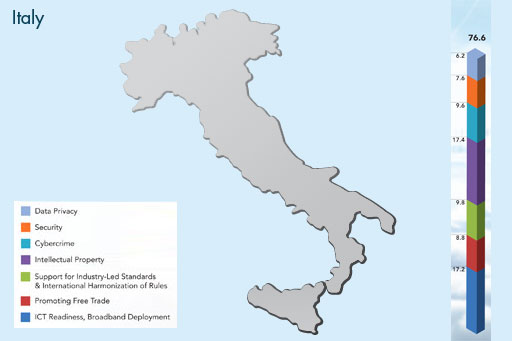 6. ItalyTotal score: 76.6Data privacy: 6.2Security: 7.6Cybercrime: 9.6Intellectual property: 17.4Support for industry-led standards: 9.8Promoting free trade: 8.8ICT readiness: 17.2
6. ItalyTotal score: 76.6Data privacy: 6.2Security: 7.6Cybercrime: 9.6Intellectual property: 17.4Support for industry-led standards: 9.8Promoting free trade: 8.8ICT readiness: 17.2 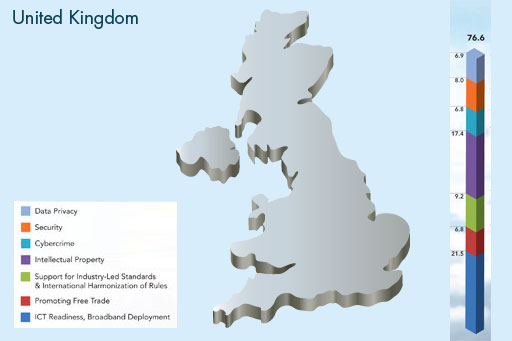 7. UnitedKingdomTotal score: 76.6Data privacy: 6.9 Security:8.0 Cybercrime:6.8 Intellectualproperty: 17.4 Support forindustry-led standards: 9.2 Promotingfree trade: 6.8 ICTreadiness: 21.5
7. UnitedKingdomTotal score: 76.6Data privacy: 6.9 Security:8.0 Cybercrime:6.8 Intellectualproperty: 17.4 Support forindustry-led standards: 9.2 Promotingfree trade: 6.8 ICTreadiness: 21.5 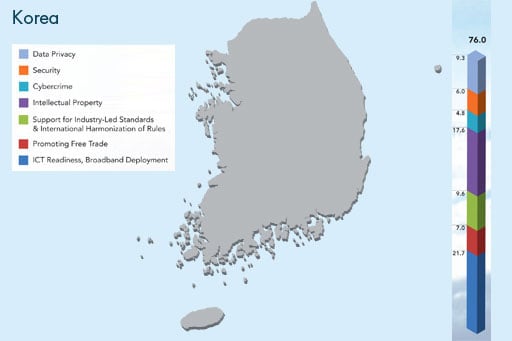 8. KoreaTotal score: 76.0Data privacy: 9.3 Security:6.0 Cybercrime:4.8 Intellectualproperty: 17.6 Support forindustry-led standards: 9.6 Promotingfree trade: 7.0 ICTreadiness: 21.7“Korea, which replaced its patchwork of privacy protectionswith modern and comprehensive legislation in 2011, scored 9.3 outof 10 available points to top the Scorecard's rankings in theprivacy section,” although the country has also implementedInternet filtering or censorship regimes “that may act as a barrierto the expansion of the digital economy and cloud computing.”
8. KoreaTotal score: 76.0Data privacy: 9.3 Security:6.0 Cybercrime:4.8 Intellectualproperty: 17.6 Support forindustry-led standards: 9.6 Promotingfree trade: 7.0 ICTreadiness: 21.7“Korea, which replaced its patchwork of privacy protectionswith modern and comprehensive legislation in 2011, scored 9.3 outof 10 available points to top the Scorecard's rankings in theprivacy section,” although the country has also implementedInternet filtering or censorship regimes “that may act as a barrierto the expansion of the digital economy and cloud computing.” 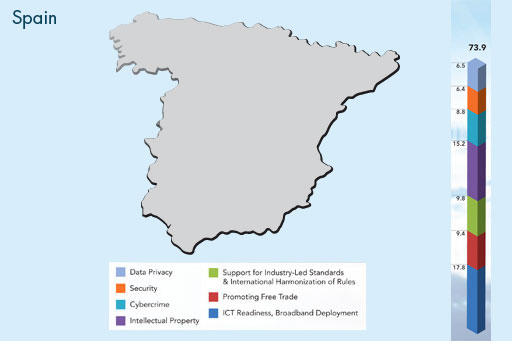 9. SpainTotal score: 73.9Data privacy: 6.5 Security:6.4 Cybercrime:8.8 Intellectualproperty: 15.2 Support forindustry-led standards: 9.8 Promotingfree trade: 9.4 ICTreadiness: 17.8
9. SpainTotal score: 73.9Data privacy: 6.5 Security:6.4 Cybercrime:8.8 Intellectualproperty: 15.2 Support forindustry-led standards: 9.8 Promotingfree trade: 9.4 ICTreadiness: 17.8 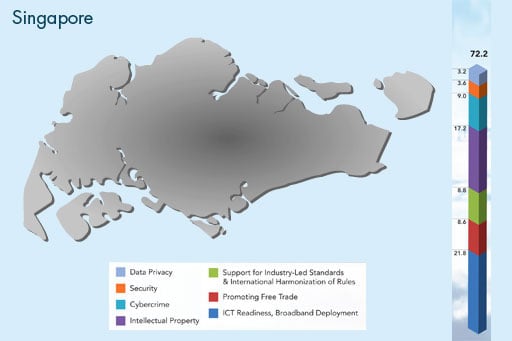 10. SingaporeTotal score: 72.2Data privacy: 3.2 Security:3.6 Cybercrime:9.0 Intellectualproperty: 17.2 Support forindustry-led standards: 8.8 Promotingfree trade: 8.6 ICTreadiness: 21.8Singapore, along with Russia and Malaysia, has signed/ratifiedthe UN Convention on Electronic Contracting, leading to greaterharmonization.
10. SingaporeTotal score: 72.2Data privacy: 3.2 Security:3.6 Cybercrime:9.0 Intellectualproperty: 17.2 Support forindustry-led standards: 8.8 Promotingfree trade: 8.6 ICTreadiness: 21.8Singapore, along with Russia and Malaysia, has signed/ratifiedthe UN Convention on Electronic Contracting, leading to greaterharmonization. 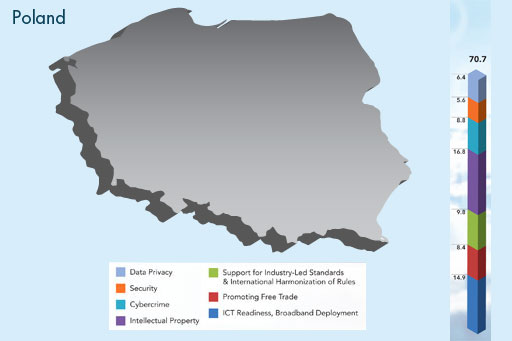 11. PolandTotal score: 70.7Data privacy: 6.4 Security:5.6 Cybercrime:8.8 Intellectualproperty: 16.8 Support forindustry-led standards: 9.8 Promotingfree trade: 8.4 ICTreadiness: 14.9
11. PolandTotal score: 70.7Data privacy: 6.4 Security:5.6 Cybercrime:8.8 Intellectualproperty: 16.8 Support forindustry-led standards: 9.8 Promotingfree trade: 8.4 ICTreadiness: 14.9 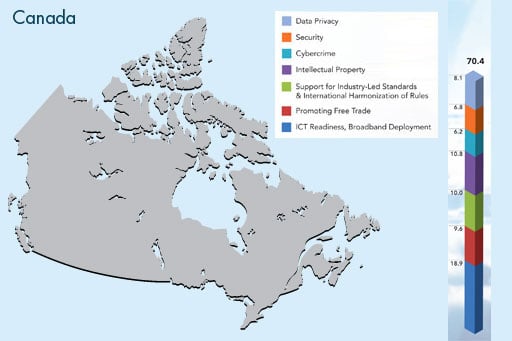 12. CanadaTotal score: 70.4Data privacy: 8.1 Security:6.8 Cybercrime:6.2 Intellectualproperty: 10.8 Support forindustry-led standards: 10.0 Promotingfree trade: 9.6 ICTreadiness: 18.9 Although Canada signed the Council of Europe Cybercrime Convention in 2001, it has failedto ratify the Convention for more than a decade; and while it has acomprehensive computer crime law in place, it lacks essentialonline investigation and enforcement tools, according to BSA.Additionally, gaps exist in the IP laws of Canada. Click on the next page to see Nos. 13 to 24 in the BSAranking.
12. CanadaTotal score: 70.4Data privacy: 8.1 Security:6.8 Cybercrime:6.2 Intellectualproperty: 10.8 Support forindustry-led standards: 10.0 Promotingfree trade: 9.6 ICTreadiness: 18.9 Although Canada signed the Council of Europe Cybercrime Convention in 2001, it has failedto ratify the Convention for more than a decade; and while it has acomprehensive computer crime law in place, it lacks essentialonline investigation and enforcement tools, according to BSA.Additionally, gaps exist in the IP laws of Canada. Click on the next page to see Nos. 13 to 24 in the BSAranking. 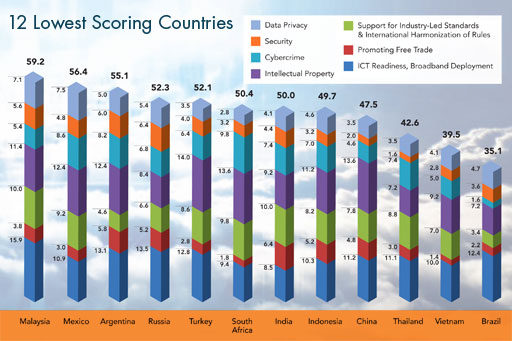
Want to continue reading?
Become a Free PropertyCasualty360 Digital Reader
Your access to unlimited PropertyCasualty360 content isn’t changing.
Once you are an ALM digital member, you’ll receive:
- All PropertyCasualty360.com news coverage, best practices, and in-depth analysis.
- Educational webcasts, resources from industry leaders, and informative newsletters.
- Other award-winning websites including BenefitsPRO.com and ThinkAdvisor.com.
Already have an account? Sign In
© 2024 ALM Global, LLC, All Rights Reserved. Request academic re-use from www.copyright.com. All other uses, submit a request to [email protected]. For more information visit Asset & Logo Licensing.








